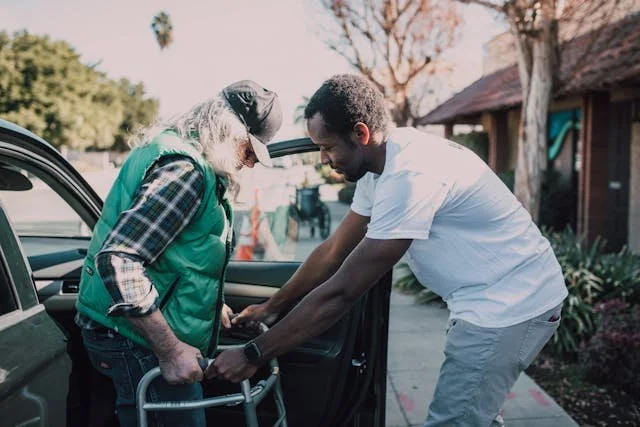Hip Fracture Injuries in Accident Cases: A Guide to Compensation in NYC
A hip fracture is a serious injury that commonly affects older adults, often resulting from falls. These fractures can cause significant pain, limited mobility, and require extensive medical treatment and rehabilitation. In some cases, hip fractures can even lead to life-threatening complications.
If you or a loved one has suffered a hip fracture in an accident in New York City due to someone else's negligence, you may be entitled to compensation. Our compassionate and experienced personal injury lawyers at Veridian Legal understand the challenges you face after such an injury. We are dedicated to providing you with strong legal representation and fighting for the maximum compensation possible for your medical expenses, lost income, pain and suffering, and other damages.
Understanding Hip Fractures
The hip joint is a ball-and-socket joint where the head of the femur (thighbone) fits into the acetabulum (socket) of the pelvis. A hip fracture is a break in the upper part of the femur, typically occurring in one of three locations:
Femoral Neck Fracture: A break in the neck of the femur, just below the femoral head.
Intertrochanteric Fracture: A break in the area between the greater and lesser trochanters (bony prominences) of the femur.
Subtrochanteric Fracture: A break in the area below the lesser trochanter.
Causes of Hip Fractures:
Falls: The most common cause of hip fractures, especially in older adults. Falls can occur due to various factors, such as:
Slips and trips on uneven surfaces, wet floors, or icy sidewalks
Loss of balance due to medical conditions or medications
Falls from heights
Direct Impact: A direct blow to the hip, such as in a car accident or a fall from a significant height.
Medical Conditions: Certain medical conditions, such as osteoporosis (weakening of the bones), can increase the risk of hip fractures.
Symptoms of a Hip Fracture:
Severe pain in the hip or groin
Inability to bear weight on the injured leg
Shortening of the injured leg
External rotation of the injured leg
Swelling and bruising around the hip
How Hip Fractures Impact Your Life
A hip fracture can significantly impact your life, affecting your mobility, independence, and overall quality of life.
Hip fractures can cause:
Severe pain: Hip fractures are often very painful, making it difficult to move, sleep, and perform daily activities.
Limited mobility: You may need to use crutches, a walker, or a wheelchair for an extended period, limiting your ability to get around and perform daily tasks.
Hospitalization and surgery: Most hip fractures require surgery to repair the broken bone, which may involve hospitalization and a lengthy recovery period.
Rehabilitation: Extensive rehabilitation, including physical therapy and occupational therapy, is often necessary to regain strength, mobility, and independence.
Emotional distress: Dealing with pain, limited mobility, and the challenges of recovery can cause anxiety, depression, and other emotional difficulties.
Loss of independence: Hip fractures can make it difficult to live independently, potentially requiring assistance with daily tasks or even a move to an assisted living facility.
Increased risk of complications: Hip fractures can increase the risk of complications such as pneumonia, blood clots, and infections.
Mortality: Hip fractures are associated with a significant increase in mortality risk, especially in older adults.
What to Do if You Suffer a Hip Fracture in an Accident
Seek immediate medical attention: Call 911 or go to the nearest emergency room.
Avoid moving the injured leg: Do not attempt to move the injured leg or bear weight on it.
Report the accident: Report the accident to the appropriate authorities, such as the police or the property owner.
Document the scene: If possible, take photos or videos of the accident scene and anything that may have contributed to the injury.
Gather information: Get contact information from any witnesses and the at-fault party.
Contact a personal injury lawyer: An experienced attorney can help you understand your rights and navigate the complex legal process.
Common Causes of Hip Fractures in NYC
Slip and Fall Accidents:
Slips and falls are the most common cause of hip fractures, especially in older adults. Common hazardous locations in NYC include:
Sidewalks: Uneven pavement, cracks, potholes, and icy conditions.
Subway Stations: Wet or slippery stairs, escalator malfunctions.
Nursing Homes and Assisted Living Facilities: Wet floors, inadequate lighting, and lack of assistive devices.
Retail Stores: Spills, wet floors, and cluttered aisles.
Car Accidents:
The impact of a car accident can cause a direct blow to the hip or force the leg into an unnatural position, leading to a fracture.
Nursing Home Negligence:
Falls in nursing homes can be caused by inadequate supervision, lack of assistive devices, or unsafe conditions.
Proving Negligence in a Hip Fracture Case in NYC
To recover compensation for a hip fracture, you need to prove that someone else's negligence caused your injury. This involves establishing:
Duty of care: The at-fault party owed you a duty of care to prevent harm.
Breach of duty: The at-fault party breached their duty of care by acting negligently or carelessly.
Causation: The at-fault party's breach of duty directly caused your hip fracture.
Damages: You suffered damages as a result of your injury.
Our attorneys will investigate your case thoroughly to gather evidence and build a strong argument for negligence.
Damages in a Hip Fracture Case
We'll fight to recover compensation for all your losses, including:
Medical Expenses: Past and future medical costs, including:
Emergency medical care
Hospitalization
Surgery
Rehabilitation
Medication
Assistive devices (walkers, wheelchairs, etc.)
Home modifications
Lost Wages: Income lost due to your inability to work.
Loss of Earning Capacity: If your injury affects your future ability to work.
Pain and Suffering: For the physical pain, emotional distress, and diminished quality of life.
Loss of Enjoyment of Life: Compensation for your inability to participate in activities you once enjoyed.
The Legal Process for Hip Fracture Injury Claims in New York — How We Can Help
If you've suffered a hip fracture in a New York City accident due to someone else's negligence, the legal process can seem daunting. At Veridian Legal, our experienced NYC hip fracture lawyers are here to help. We understand the complexities of New York personal injury law and will immediately begin investigating your case, gathering crucial evidence like police reports, accident scene photos, witness statements, and medical records to establish liability. We'll meticulously calculate all your damages, including medical expenses (past and future), lost wages, pain and suffering, and the long-term impact on your quality of life. Our skilled negotiators will fight for a fair settlement with insurance companies. If necessary, we're prepared to litigate your hip fracture case in court to maximize your compensation. We handle all aspects of your claim, from initial consultation to trial, providing personalized attention and compassionate support every step of the way. Contact Veridian Legal today for a free consultation to discuss your hip fracture injury claim in NYC.
Types of Treatment for Hip Fractures
Treatment for a hip fracture typically involves:
Surgery: Most hip fractures require surgery to repair the broken bone. Surgical options include:
Open Reduction and Internal Fixation (ORIF): The surgeon makes an incision to access the broken bone, realigns the fragments, and then uses screws, plates, or rods to hold the bones in place.
Intramedullary Nailing: A rod is inserted into the center of the femur to stabilize the fracture.
Hip Replacement: In some cases, a hip replacement surgery may be necessary, especially if the fracture is severe or the joint is damaged.
Medications: Pain relievers, anti-inflammatories, and medications to prevent blood clots may be prescribed.
Rehabilitation: Physical therapy and occupational therapy are essential to help regain strength, mobility, and independence after surgery.
Complications of Hip Fractures
Potential complications of hip fractures include:
Avascular Necrosis: Death of bone tissue due to lack of blood supply.
Nonunion: Failure of the fracture to heal properly.
Infection: Risk of infection, especially with open fractures or surgical procedures.
Blood clots: Deep vein thrombosis (DVT) or pulmonary embolism (PE).
Pneumonia: Increased risk of pneumonia, especially in older adults.
Death: Hip fractures can be life-threatening, especially in frail older adults.
Rehabilitation and Long-Term Care for Hip Fractures
Rehabilitation is crucial after a hip fracture to help regain strength, mobility, and independence. It may involve:
Physical therapy: Exercises and stretches to improve range of motion, strength, and balance.
Occupational therapy: Help with daily activities, such as dressing, bathing, and cooking.
Assistive devices: Walkers, canes, or other devices to aid in mobility.
For some individuals, long-term care may be necessary, including:
Home healthcare: Nurses, aides, and therapists who provide care in the home.
Assisted living facilities: Residential facilities that provide assistance with daily activities.
Nursing homes: Facilities that provide 24-hour care for individuals with complex medical needs.
Emotional and Psychological Impact of Hip Fractures
Hip fractures can have a significant emotional and psychological impact, including:
Fear of falling: Many individuals develop a fear of falling after a hip fracture, which can limit their activity and social interaction.
Depression: Feelings of sadness, hopelessness, and loss of independence.
Anxiety: Worry about the future and the ability to recover.
It's important to seek support and counseling to address these emotional challenges.
Financial and Legal Considerations for Hip Fractures
Hip fractures can lead to significant financial burdens due to:
Medical expenses: Costs for hospitalization, surgery, rehabilitation, medication, assistive devices, and long-term care.
Lost income: Inability to work due to the injury.
Loss of earning capacity: Reduced ability to earn income in the future.
Legal options for seeking compensation may include:
Personal injury lawsuits: If the injury was caused by someone else's negligence.
Premises liability claims: If the injury occurred due to a hazardous condition on someone else's property.
Nursing home negligence claims: If the injury occurred due to neglect or abuse in a nursing home.
FAQs About Hip Fractures
How long does it take to recover from a hip fracture? Recovery time varies depending on the severity of the fracture, the individual's overall health, and the type of treatment received. It can take several months or even longer to fully recover.
What are the long-term effects of a hip fracture? Long-term effects can include chronic pain, limited mobility, loss of independence, and increased risk of complications.
Will I need surgery for my hip fracture? Most hip fractures require surgery to repair the broken bone.
What can I do to prevent hip fractures? Preventive measures include maintaining strong bones through exercise and calcium intake, preventing falls by removing tripping hazards and using assistive devices, and getting regular bone density screenings.
Additional Resources
Contact Our Hip Fracture Injury Lawyers Today
If you or a loved one has suffered a hip fracture in an accident in New York City, contact Veridian Legal today for a free consultation.
Call us now at (212) 706-1007 or fill out our online contact form to get started.
Contact Us
Free Consultation
212-706-1007
Practice Areas
The attorneys at Veridian Legal have years of experience representing abuse victims and those who have suffered personal injury. As your lawyers we will fight tirelessly for the justice and compensation you deserve.
Our practice areas include:
Common Injures
Veridian Legal lawyers have experience helping with all of your injuries. Some common injuries we see in our cases include:
Veridian Legal Personal Injury Blog
Client Reviews
Meet the Team
-

Cali Madia
PARTNER
-

Daniel Szalkiewicz
PARTNER









